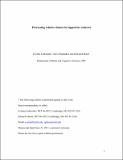Processing relative clauses in supportive contexts
Author(s)
Fedorenko, Evelina G.; Piantadosi, Steven Thomas; Gibson, Edward A.
DownloadFedorenko, Piantadosi & Gibson June 23 2011[1].pdf (578.6Kb)
OPEN_ACCESS_POLICY
Open Access Policy
Creative Commons Attribution-Noncommercial-Share Alike
Terms of use
Metadata
Show full item recordAbstract
Results from two self-paced reading experiments in English are reported in which subject- and object-extracted relative clauses (SRCs and ORCs, respectively) were presented in contexts that support both types of relative clauses (RCs). Object-extracted versions were read more slowly than subject-extracted versions across both experiments. These results are not consistent with a decay-based working memory account of dependency formation where the amount of decay is a function of the number of new discourse referents that intervene between the dependents (Gibson, 1998; Warren & Gibson, 2002). Rather, these results support interference-based accounts and decay-based accounts where the amount of decay depends on the number of words or on the type of noun phrases that intervene between the dependents. In Experiment 2, presentation in supportive contexts was directly contrasted with presentation in null contexts. Whereas in the null context the extraction effect was only observed during the RC region, in a supportive context the extraction effect was numerically larger and persisted into the following region, thus showing that extraction effects are enhanced in supportive contexts. A sentence completion study demonstrated that the rate of SRCs versus ORCs was similar across null and supportive contexts (with most completions being subject-extractions), ruling out the possibility that an enhanced extraction effect in supportive contexts is due to ORCs being less expected in such contexts. However, the content of the RCs differed between contexts in the completions, such that the RCs produced in supportive contexts were more constrained, reflecting the lexical and semantic content of the preceding context. This effect, which we discuss in terms of expectations/lexico-syntactic priming, suggests that the enhancement of the extraction effect in supportive contexts is due to the facilitation of the subject-extracted condition.
Date issued
2012-01Department
Massachusetts Institute of Technology. Department of Brain and Cognitive SciencesJournal
Cognitive Science
Publisher
John Wiley & Sons, Inc.
Citation
Fedorenko, Evelina, Steve Piantadosi, and Edward Gibson. “Processing Relative Clauses in Supportive Contexts.” Cognitive Science 36.3 (2012): 471–497. Web. 15 Oct. 2012.
Version: Author's final manuscript
ISSN
1551-6709
0364-0213